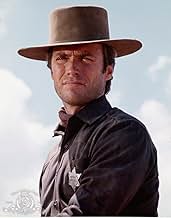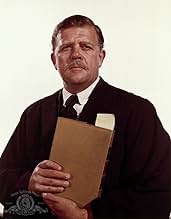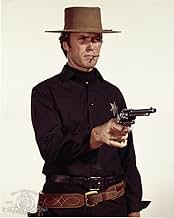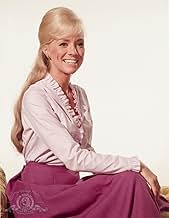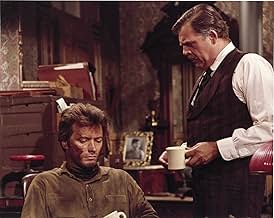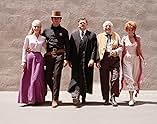Lorsqu'un innocent échappe de justesse à un lynchage, il réapparaît après avoir été fait homme de loi déterminé à traduire ses agresseurs en justice.Lorsqu'un innocent échappe de justesse à un lynchage, il réapparaît après avoir été fait homme de loi déterminé à traduire ses agresseurs en justice.Lorsqu'un innocent échappe de justesse à un lynchage, il réapparaît après avoir été fait homme de loi déterminé à traduire ses agresseurs en justice.
Histoire
Le saviez-vous
- AnecdotesInger Stevens had never heard of Clint Eastwood before she was cast. Once they met she began to like him very much and they ended up having an affair during filming. When the film was finished, Stevens told director Ted Post: "Anytime you do a picture with Clint and there's a part in it, call me."
- GaffesWhen Jed is rescued from the noose, a white vehicle can be seen flashing quickly between the trees in the distance.
- Citations
Jed Cooper: You don't remember me, do you?
Reno, Cooper Hanging Party: No.
Jed Cooper: [showing his hanging scar] When you hang a man, you better look at him.
- Versions alternativesAs with many westerns at the time the UK cinema version was cut by the BBFC to reduce facial closeups during the opening lynching and to edit Cooper's fight with Miller. Later video/DVD releases were intact.
- ConnexionsFeatured in Legends of the West (1992)
- Bandes originalesShall We Gather at the River?
Members of choir and congregation, First Baptist Church, Las Cruces NM
By Robert Lowry
Sung by crowd before mass hanging
Commentaire à la une
This was Clint Eastwood's American Western debut that I had never really seen all the way through until now. At first I thought it would be another ride 'em high, cowboys n' indians flick that was popular in America those days... before Sergio Leone shook the genre down to its raw and merciless possibilities.
The film was pretty good, and the moral undercurrent of justice "by a dirty rope on the plain, or a judge in a robe standing before the American flag" is rather striking. The Federal judge is by far one of the most interesting characters I have seen yet in a Western.
Indeed, the grittiest and most barbaric scene is not the lynching of an innocent man, but the public hanging on the eve of statehood... to prove that Oklahoma Territory executed the sort of justice required of a "civilized" state of the Union. It is made a public spectacle with beautiful hymns and cold beer. And just the way each of the condemned faces his execution is tongue in cheek.
Then there was the campfire scene where Captain Wilson confers with his employees regarding their options: irony, fear and desperation. They put a human face on their culpability, similiarly echoed decades later by Little Bill's "I don't deserve this, I was building house." And the few who chose not to run chose a desperate and violent option.
A dillemic "no one wins" justice spiralling into graphic violence... and ultimately an undiginified and graceless death. What was perfected into poignant brevity by Unforgiven was born in Hang Em High's exploration of two men's differing approaches to an unforgiving justice... a justice that led either to the end of a noose, or the end of a gun.
Not bad at all...
The film was pretty good, and the moral undercurrent of justice "by a dirty rope on the plain, or a judge in a robe standing before the American flag" is rather striking. The Federal judge is by far one of the most interesting characters I have seen yet in a Western.
Indeed, the grittiest and most barbaric scene is not the lynching of an innocent man, but the public hanging on the eve of statehood... to prove that Oklahoma Territory executed the sort of justice required of a "civilized" state of the Union. It is made a public spectacle with beautiful hymns and cold beer. And just the way each of the condemned faces his execution is tongue in cheek.
Then there was the campfire scene where Captain Wilson confers with his employees regarding their options: irony, fear and desperation. They put a human face on their culpability, similiarly echoed decades later by Little Bill's "I don't deserve this, I was building house." And the few who chose not to run chose a desperate and violent option.
A dillemic "no one wins" justice spiralling into graphic violence... and ultimately an undiginified and graceless death. What was perfected into poignant brevity by Unforgiven was born in Hang Em High's exploration of two men's differing approaches to an unforgiving justice... a justice that led either to the end of a noose, or the end of a gun.
Not bad at all...
- catch22000
- 6 janv. 2004
- Permalien
Meilleurs choix
Connectez-vous pour évaluer et suivre la liste de favoris afin de recevoir des recommandations personnalisées
Détails
Box-office
- Budget
- 1 600 000 $US (estimé)
- Montant brut aux États-Unis et au Canada
- 11 000 000 $US
- Montant brut mondial
- 11 000 000 $US
Contribuer à cette page
Suggérer une modification ou ajouter du contenu manquant

Lacune principale
By what name was Pendez-les haut et court (1968) officially released in India in English?
Répondre

